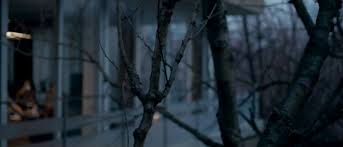31 January 2014
Elena is a film with a lot of contrast. First, with gender roles. Then, with income.
The mother figure, Elena, is married to the wealthy Vladimir. They both had children before they met each other. Vlad has a girl named Katya. Elena has a boy, Sergey, with a family of his own.
Vladimir and Elena demonstrate, for us, traditional gender roles. Vlad is the bread-winner, head of the household and strict. Elena is nurturing (she was a nurse, after all), submissive, and a good mother with unconditional love for her child.
The children of Vlad and Elena represent somewhat non-traditional gender roles. Katya, for example, seems unattached and does not desire children. Caring, motherly and submissive are the last words that we would use to describe her. Even though her father is disappointed in her lack of desire for children, he still loves her very much. We can assume that he raised her and this is why she turns out so much like her father: masculine qualities and the goal of money. Despite her outwardly appearance, we can see that she loves her father very much.
Then, we have Elena’s son, Sergey. He is a lazy drunk and his son, Sasha, grows up to be the same. He keeps having children yet cannot take care of them. He completely relies on his mother for financial support yet does not seem to appreciate her. In a way, he is like Katya: spoiled. He is also the opposite of a traditional male should be. He is no bread-winner and he hardly is in control of his household.
The conflict of the story is that Sasha, Elena’s grandson, needs money to bribe his way into college. Elena asks Vlad for the money. He gives a firm no, saying that Sergey needs to take this as a lesson to clean his act up and support his family. And so, Elena murders Vlad, even though she seems to really love him, in order to get the money for her son’s family.
We can say that Elena is a good mother because she is willing to do quite anything for her son. Yet at the same time, she refuses to discipline him. After going through so much to help one grandson, she finds out at the end that there will be yet another. Sergey has learned nothing. He does not care. A spoiled child is almost as bad as an unloved one. Neither situation shows any promising results for the next generation.
There was also the recurring theme of the sparrow. The movie starts with a dead tree and sparrows join it. Then, with her baby grandson, Elena looks for sparrows in the sky. Next, we hear the coo of a sparrow after Vlad dies and Katya and Elena mourn. Finally, the film ends with the same tree yet this time with no sparrows.
Maybe the tree represented their life: ordinary and bland. The sparrows were the fleeting moments of happiness. Or they could even be reason. The movie starts with two sparrows on the tree, representing some hope. It ends with none.
To conclude, although Elena is a great mother, I can only see our heroine as a villan. Below not loving your child, spoiling a child is the next worst thing a mother can do for that child and for society.


